

Joseph Lubin (entrepreneur) Jim’s Blog. Curtis Yarvin - Wikipedia. Jeff Dean (computer scientist) - Wikipedia. Jeffrey Adgate "Jeff" Dean (born 1968) is an American computer scientist and software engineer.
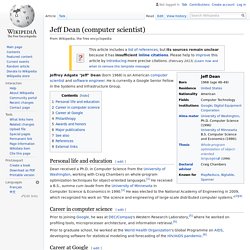
He is currently a Google Senior Fellow in the Systems and Infrastructure Group. Mu Li's Homepage. Tianqi Chen. I am a Ph.D.
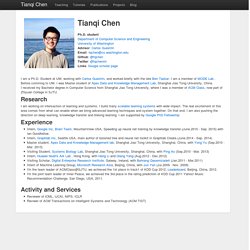
Student at UW, working with Carlos Guestrin, and worked briefly with the late Ben Taskar. I am a member of MODE Lab . Before comming to UW. Alexander J. Smola. Geoffrey Hinton - Wikipedia. Geoffrey Everest Hinton FRS[6] (born 6 December 1947) is a British-born Canadian[7] cognitive psychologist and computer scientist, most noted for his work on artificial neural networks.
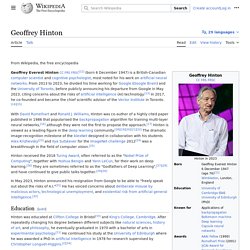
As of 2015[update] he divides his time working for Google and University of Toronto.[8] He was one of the first researchers who demonstrated the use of generalized backpropagation algorithm for training multi-layer neural nets and is an important figure in the deep learning community.[9][10][11] Education[edit] Hinton was educated at King's College, Cambridge graduating in 1970, with a Bachelor of Arts in experimental psychology.[1] He continued his study at the University of Edinburgh where he was awarded a PhD in artificial intelligence in 1977 for research supervised by H.
Christopher Longuet-Higgins.[3][12] Career[edit] Michael Widenius - Wikipedia. Ulf Michael Widenius (often called Monty; born 3 March 1962, in Helsinki, Finland) is the main author of the original version of the open source MySQL database, a founding member of the MySQL AB company and is currently CTO of the MariaDB Corporation Ab.
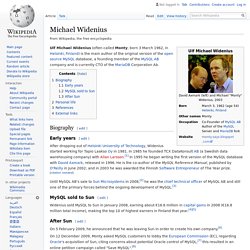
Biography[edit] Early years[edit] Until MySQL AB's sale to Sun Microsystems in 2008,[2] he was the chief technical officer of MySQL AB and still one of the primary forces behind the ongoing development of MySQL.[3] Stephen Wolfram. Stephen Wolfram (born 29 August 1959) is a British scientist,[7] known for his work in theoretical physics, as the chief designer of the Mathematica software application and the Wolfram Alpha answer engine, as well as the CEO of Wolfram Research, and the author of A New Kind of Science.[2][8][9][10][11][12][13] Background[edit] Wolfram's parents were Jewish refugees who emigrated from Germany to England in the 1930s.[5][14] Wolfram's father Hugo was a textile manufacturer and novelist (Into a Neutral Country) and his mother Sybil was a professor of philosophy at the University of Oxford.[15] He has a younger brother, Conrad Wolfram.[16] Wolfram is married to a mathematician and has four children.[17]
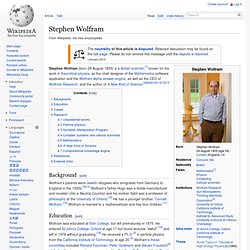
Ceph: get the best of your SSD with primary affinity - Sébastien Han. Matei Zaharia. Matei Zaharia is a Romanian-Canadian computer scientist specializing in big data, distributed systems, and cloud computing.
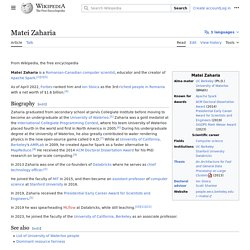
He is a co-founder and CTO of Databricks, and an assistant professor of computer science at the Massachusetts Institute of Technology.[1] He created the Apache Spark project and co-created the Apache Mesos project during his PhD at UC Berkeley, and also designed the core scheduling algorithms used in Apache Hadoop, including the most widely used fair scheduler.[2] Biography[edit] Matei Zaharia was born in Romania. His family moved to Canada later and he attended the University of Waterloo for Computer Science. He received the Governor General’s Academic Silver Medal for highest academic standing upon graduation from the University of Waterloo. Michael Stonebraker. Michael Ralph Stonebraker (born October 11, 1943[2]) is a computer scientist specializing in database research.
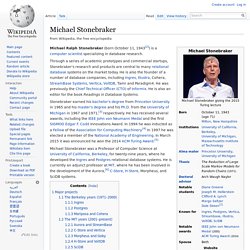
Stonebraker earned his bachelor's degree from Princeton University in 1965 and his master's degree and his Ph.D. from the University of Michigan in 1967 and 1971,[3] respectively. He has received several awards, including the IEEE John von Neumann Medal and the first SIGMOD Edgar F. Codd Innovations Award. In 1994 he was inducted as a Fellow of the Association for Computing Machinery.[4] In 1997 he was elected a member of the National Academy of Engineering. Leslie Lamport. Leslie B.
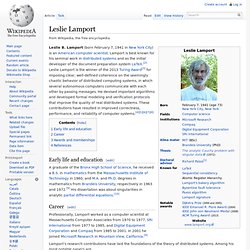
Lamport (born February 7, 1941 in New York City) is an American computer scientist. Lamport is best known for his seminal work in distributed systems and as the initial developer of the document preparation system LaTeX.[2] Leslie Lamport is the winner of the 2013 Turing Award[3] for imposing clear, well-defined coherence on the seemingly chaotic behavior of distributed computing systems, in which several autonomous computers communicate with each other by passing messages. He devised important algorithms and developed formal modeling and verification protocols that improve the quality of real distributed systems. 최윤섭의 Healthcare Innovation. IT와 생명과학, 의학의 컨버젼스를 통해 사회적 가치를 창출하고 환자들의 삶을 개선하는 것을 화두로 삼고 있는 융합 생명과학자이자, Blogger, Health IT Convergence Evangelist 입니다.

Alex Benik. Alex joined Battery in 2001 and currently works out of the firm’s Boston office.
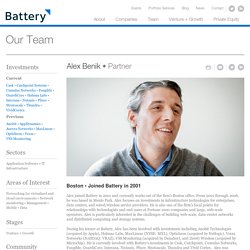
From 2001 through 2006, he was based in Menlo Park. Alex focuses on investments in infrastructure technologies for enterprises, data centers, and wired/wireless service providers. Our Latest Flash Memory Investment: The Devil Made Us Do It. Today we announced our investment in Ottawa-based Diablo Technologies, along with Hasso Plattner Ventures and existing investors Celtic House and The Business Development Bank of Canada. From what I can determine, Diablo’s $28m round is the largest investment in a Canadian technology start-up in over a decade. And while that’s interesting, it doesn’t hold a candle to the technology and vision that warrants such a big bet. While Diablo isn’t announcing its products just yet, it has developed a revolutionary new approach to incorporating flash memory into computing systems.
It’s called Memory Channel Storage (MCS) and we think it represents a dramatic shift in the storage/memory hierarchy. We are extremely excited to be working with this outstanding team and personally I am really looking forward to skating on the canal! Gary W. Keller. Gary Keller is an author of books on real estate investing, and the co-founder and chairman of the board of Keller Williams Realty, an Austin, Texas-based real estate franchising company.[1] Biography[edit] 올바로 나누어 : 34. 마지막 때의 징조들. 34. 마지막 때의 징조들 우리는 주님이 재림하시는 정확한 날짜를 알 수는 없으나 시대의 특징을 보고 그때가 가까왔음을 알 수 있다. George Orwell. English author and journalist Eric Arthur Blair (25 June 1903 – 21 January 1950),[1] better known by his pen name George Orwell, was an English novelist, essayist, journalist and critic, whose work is marked by lucid prose, awareness of social injustice, opposition to totalitarianism, and outspoken support of democratic socialism.[2][3] Life Early years.
Nineteen Eighty-Four. History and title[edit] A 1947 draft manuscript of the first page of Nineteen Eighty-Four, showing the editorial development. The Last Man in Europe was an early title for the novel but in a letter dated 22 October 1948 to his publisher Fredric Warburg, eight months before publication, Orwell wrote about hesitating between The Last Man in Europe and Nineteen Eighty-Four.[14] Warburg suggested changing the main title to a more commercial one.[15] Copyright status[edit]
Big Brother (Nineteen Eighty-Four) In the society that Orwell describes, every citizen is under constant surveillance by the authorities, mainly by telescreens. The people are constantly reminded of this by the phrase "Big Brother is watching you", the maxim ubiquitous on display. Since the publication of Nineteen Eighty-Four, the term "Big Brother" has entered the lexicon as a synonym for abuse of government power, particularly in respect to civil liberties, often specifically related to mass surveillance. Additional speculation from Douglas Kellner of UCLA argued that Big Brother represents Joseph Stalin and that the novel portrayed life under totalitarianism.[1][2] In the novel, it is never made clear whether Big Brother was a real person or an invention by the Party to personify itself.
In Party propaganda, Big Brother is presented as one of the founders of the Party, along with Goldstein. A spontaneous ritual of devotion to Big Brother ("BB") is illustrated at the end of the "Two Minutes Hate": Michael Lewis. Marcel Proust. 이단 교회. À̴ܱ³È¸´Â Çϳª´ÔÀ» ¹ÏÀ¸¸é¼µµ ¿¹¼ö´ÔÀÇ ½Å¼º°ú Àμº, »ïÀ§ÀÏü·Ð, À¯ÀÏÇÑ ±¸¿øÁÖ, À¯ÀÏÇÑ Áߺ¸ÀÚ, ÇÇÀÇ ´ë¼Ó, ó³à ź»ý, ¸ðµç ±âÀû, ¸öÀÇ ºÎÈ°°ú ½Âõ, ½ÉÆÇ°ú À縲, õ±¹°ú Áö¿Á µî ±âº»ÀûÀÎ ±³¸®¸¦ ¹ÏÁö ¾Ê´Â ´ÜüÀÔ´Ï´Ù. À̴ܺзù ÀÚ·á¸ðÀ½ T. K. Seung. T. K. 미닉스의 작은 이야기들. Cloud, Open source, and Startup. Hannibal. Hannibal lived during a period of great tension in the Mediterranean, when the Roman Republic established its supremacy over other great powers such as Carthage, the Hellenistic kingdoms of Macedon, Syracuse, and the Seleucid empire. One of his most famous achievements was at the outbreak of the Second Punic War, when he marched an army, which included war elephants, from Iberia over the Pyrenees and the Alps into northern Italy.
Perspectives. Roy Fielding. Roy Fielding speaking at OSCON08. Wright brothers. The Wright brothers, Orville (August 19, 1871 – January 30, 1948) and Wilbur (April 16, 1867 – May 30, 1912), were two American brothers, inventors, and aviation pioneers who were credited[1][2][3] with inventing and building the world's first successful airplane and making the first controlled, powered and sustained heavier-than-air human flight, on December 17, 1903.
From 1905 to 1907, the brothers developed their flying machine into the first practical fixed-wing aircraft. Although not the first to build and fly experimental aircraft, the Wright brothers were the first to invent aircraft controls that made fixed-wing powered flight possible. Sebastian Seung's Home Page. Sebastian Seung. The Seung Lab. Christopher Langan. Cognitive-Theoretic Model of the Universe. Eric Brewer (scientist) Volatile and Decentralized. A Retrospective on SEDA. Michael Widenius. William Farel. John Calvin. C. S. Lewis. Reinhold Niebuhr. Søren Kierkegaard. Biz Stone. Evan Williams (entrepreneur) Marissa Mayer. Joi Ito. John D. Carmack. Masters of Doom. David Kushner. John Romero. Q&A: Fountainhead's Kang Talks Orcs & Elves DS, Wii Possibilities.
Brad Fitzpatrick.